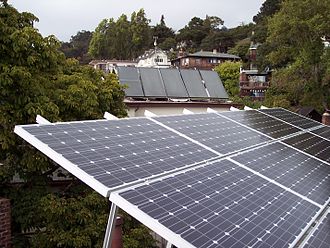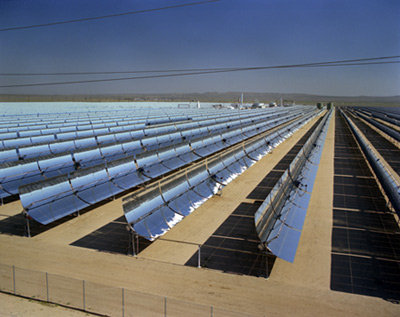
Photovoltaic (foreground) and Solar water heating (rear) panels located on rooftops in Berkeley, California. (Photo: Public Domain)
CPUC Shelves Plan to Reduce Energy Discounts For Solar Panel Owners
Plan would have reduced solar power usage, raise monthly bills for panel owners
By Evan Symon, February 5, 2022 2:44 am
The California Public Utilities Commission (CPUC) indefinitely shelved a plan on Thursday that would have reduced energy bill discounts for people who install solar panels and storage systems.
Under the Net Energy Metering (NEM) 3.0 proposal first introduced last year by CPUC, utility companies would allowed to greatly reduce the payment amount given to homeowners with solar panels for putting all excess energy production and battery stored energy back into the grid. To access the grid, homeowners with solar panels would have to pay an $8 per kilowatt (KW) monthly solar capacity charge, with the average owner paying $56 a month, or $672 a year.
Despite the proposal progressing through CPUC, with many utility companies behind it, many home owners, environmentalists, solar companies, and lawmakers from both parties continued to speak out against it. Many experts noted that solar savings would drop by 57-71% if implemented, with 95% of Californians saying that they would not buy solar panels under the new regulations.
Rallies also took place in Los Angeles, San Francisco, and Sacramento, with thousands coming out in opposition to the CPUC plan. Big solar companies, with a lot at stake in California, ramped up their protests, including Tesla, who asked their employees to help fight the changes.
While CPUC highlighted the need for reform, including concern that the solar incentives became a massive subsidy for wealthy homeowners while many who couldn’t afford it were kept out of the incentives, others shot back that this was important for the environment, and that more adoption would not only lower carbon emissions, but would also lead to cheaper and more widely available systems in the future.
“A lot of newer technologies were once only available to the wealthy or wealthy groups,” said Ronald Cain, a Palo Alto-tech advisor, to the Globe on Friday. “Cars, computers, cell phones, you name it. These were all once prohibitively expensive. Then came wide adoption and the lowering of costs so that a lot of people could afford them. Solar panels are at that point right now. The only difference is that those technologies didn’t have a lot of incentives in place to adopt them, and solar panels do by selling back unused electricity. Stopping that would just hurt so much.”
The massive backlash prompted both CPUC and Governor Gavin Newsom to delay a January 27th vote on adopting the policy. At first delayed until the February 10th meeting, on Thursday it was delayed again indefinitely as massive changes are now needed to assuage the large number of critics and people it would negatively affect.
“Oral arguments will be scheduled at a later date,” said CPUC President Alice Reynolds in a brief statement on Thursday, confirming that CPUC wanted more time to go over the changes.
Opposition groups on Thursday and Friday celebrated the delay, saying that California was now reconsidering adopting the plan and that greater solar adoption and expansion could still be possible.
“The proposed decision never made sense for a host of reasons,” said Solar Energy Industries Association vice president of state and regulatory affairs Sean Gallagher on Thursday. “We look forward to continuing to work with the California Public Utilities Commission as it considers any changes to net metering.”
Environment California director Laura Deehan added that “We are glad to hear that the commission is working to get this proposal right. I’ve walked alongside thousands of concerned citizens who want our state to catch more solar energy from our rooftops. Governor Newsom heard us, and made clear that changes had to be made to the proposal. Now, the commission needs to make sure that California continues its solar leadership.”
It is currently unknown when the next meeting on net metering would be, or what changes CPUC would consider following increased governmental and public pressure.
- Bill to Require Law Enforcement Disclosure if AI Was Used To Help Write Reports - August 7, 2025
- Gov. Newsom Files FOIA Request To ‘Expose True Cost’ Of L.A. Federal Troop Deployment for Anti-ICE Riots - August 6, 2025
- California Redistricting: How Newsom’s Plan Will Demolish Hard Fought GOP Gains - August 6, 2025






